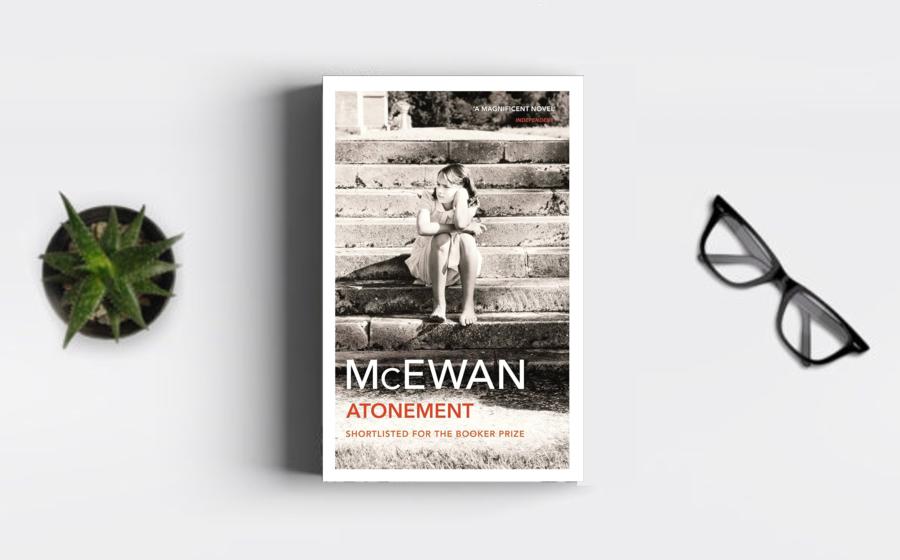"Atonement" stands as a literary masterpiece, a
tapestry of guilt and redemption woven with the threads
of intricate narrative craftsmanship. Published in 2001,
this novel has earned its place among the top books of
all time, captivating readers with its exploration of
the consequences of one fateful lie. In this review, we
delve into the thematic depth, narrative complexity, and
emotional resonance that make "Atonement" a timeless
work of art.
At the heart of "Atonement" lies
a lie, a seemingly innocuous fabrication that sets in
motion a series of tragic events with far-reaching
consequences. Briony Tallis, a thirteen-year-old
aspiring writer, bears witness to a moment of intimacy
between her sister Cecilia and Robbie Turner, the son of
the family's housekeeper. Misinterpreting the encounter,
Briony's lie unleashes a cascade of events that
irrevocably alters the lives of those involved.
The novel explores the profound impact of guilt on both
the individual and collective conscience. Briony's lie
becomes a burden that she carries throughout her life, a
weight that shapes her identity and relationships.
McEwan skillfully navigates the complexities of guilt,
portraying it as a force that transcends time,
influencing the characters' trajectories and echoing
through the decades.
The act of atonement, as
suggested by the title, becomes a central theme as
characters grapple with the consequences of their
actions. McEwan delves into the intricate psychology of
guilt, examining how individuals seek redemption and
whether true atonement is ever achievable.
"Atonement" is renowned for its
narrative complexity, employing a multilayered structure
that blurs the boundaries between truth and fiction. The
novel is divided into three parts, each offering a
distinct perspective on the events that unfold. The
first part unfolds through the eyes of Briony, the
second shifts to Robbie's perspective, and the third
introduces an older Briony as she attempts to reconcile
with her past.
This intricate narrative structure
not only engages readers intellectually but also serves
as a thematic exploration of the nature of storytelling
itself. McEwan invites reflection on the act of writing,
the subjectivity of memory, and the power of narrative
to shape reality. The novel becomes a meditation on the
ways in which individuals construct their own truths,
and how these truths can be manipulated or distorted
through the act of storytelling.
The inclusion of
Briony as both a character and a narrator introduces a
layer of reflexivity, prompting readers to question the
reliability of the narrative. The novel becomes a
self-conscious exploration of the author's role in
shaping the story, challenging traditional notions of
objective storytelling.
The
characters in "Atonement" are intricately drawn, their
lives intricately interconnected and shaped by the
circumstances set in motion by Briony's lie. Robbie
Turner, a working-class intellectual with aspirations of
becoming a doctor, finds his future shattered by false
accusations. Cecilia Tallis, the object of his
affection, grapples with societal expectations and her
own desires. Briony, burdened by guilt, seeks redemption
through her writing and attempts to reconcile with the
impact of her actions.
McEwan's portrayal of the
characters is nuanced and empathetic. The novel delves
into the complexities of human relationships, exploring
themes of love, desire, and the inexorable passage of
time. Robbie and Cecilia's love story becomes a poignant
thread woven into the larger tapestry of the narrative,
a love that defies social barriers and persists against
the backdrop of war.
Briony's character undergoes
significant development, transitioning from a precocious
young girl with a penchant for storytelling to an older
woman grappling with the consequences of her actions.
Her narrative becomes a vehicle for self-reflection and
an exploration of the limitations of memory and
perception.
"Atonement" unfolds
against the backdrop of pre-war England and extends into
the post-war era, providing a panoramic view of a
society in flux. The novel captures the idyllic yet
brittle world of the Tallis family's estate, the
upheaval brought by World War II, and the aftermath that
reverberates through the lives of the characters.
The war becomes a transformative force, disrupting
societal norms and reshaping individual destinies.
McEwan's depiction of wartime experiences is both
harrowing and evocative, illustrating the impact of
global events on the intimate fabric of human lives. The
temporal scope of the novel adds depth and resonance,
creating a narrative that transcends its immediate
context to explore universal themes of love, loss, and
the search for redemption.
McEwan's prose style in
"Atonement" is characterized by its elegance and
precision. Each sentence is crafted with meticulous
care, contributing to the overall literary beauty of the
novel. The author's ability to evoke vivid imagery,
convey complex emotions, and create a sense of
atmosphere elevates the reading experience to a level of
aesthetic appreciation.
The prose style reflects
McEwan's commitment to the art of storytelling, with
every word carefully chosen to convey the nuances of the
narrative. The novel's linguistic richness adds to its
enduring appeal, making it a work that resonates not
only thematically but also stylistically.
In 2007, "Atonement" received a cinematic
adaptation directed by Joe Wright. The film, like the
novel, garnered critical acclaim for its visual
storytelling, evocative cinematography, and powerful
performances. The adaptation successfully captured the
essence of McEwan's narrative while leveraging the
visual medium to enhance the emotional impact of the
story.
The success of the cinematic adaptation
further solidifies "Atonement" as a work with enduring
cross-media appeal, demonstrating the universal
resonance of its themes and the adaptability of its
narrative to different artistic forms.
"Atonement" stands as a literary tour de force, a work of art that navigates the intricacies of guilt, redemption, and the power of storytelling. Through its thematic depth, narrative complexity, and profound characterization, the novel has earned its place among the top books of all time.






